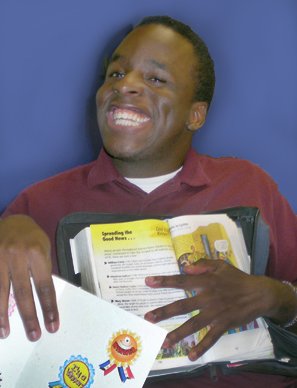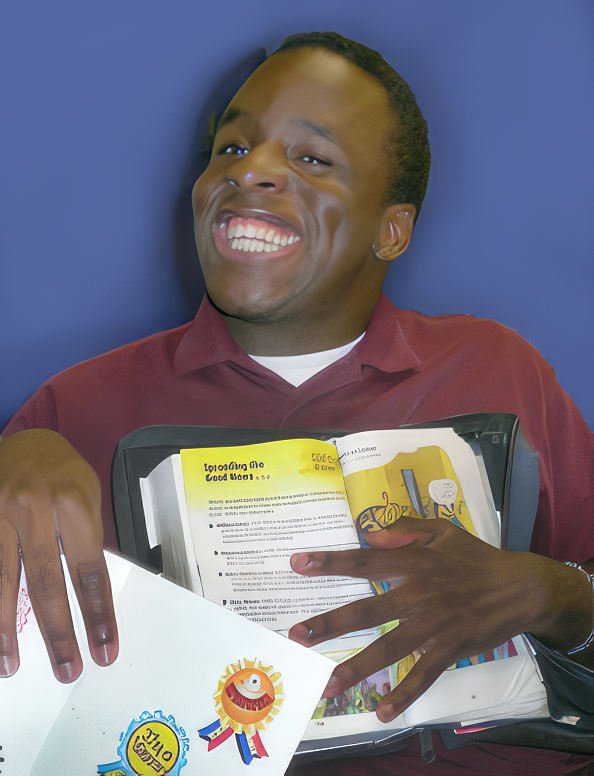Discipling Those With Disabilities
Interview with Greg Brown by Dean Ridings March 2023
Dean Ridings is field staff with The Navigator
I met recently with Greg Brown, a longtime friend who heads Mephibosheth Ministry, which is “dedicated to encouraging and equipping the local church of Jesus to reach out into their communities and minister the gospel of Jesus to those families who have been affected by a disability.” It was an inspirational time!
We met about a friend who has asked where they can get support for their disabled 9 year old daughter. I interviewed Greg about Mephibosheth Ministry.
1. Why is it important to share the gospel with the disabled, even those who are unable to speak?

The joy that comes from knowing the Lord Jesus Christ is for everyone!
Everyone is disabled, everyone—by sin. We have an inherent disability that only has one cure. The ultimate end of man is death—everyone. It’s the only way out of here. So, the only cure, the redeeming blood of Jesus Christ, which offers eternal life, is available to all—everyone.
We are all challenged by the result of the fall, some more than others. Throughout the Gospels, the example set by Jesus, in word and deed, was to reach out to those in need. The community was improved after the lives of those least fortunate were changed. The very nature of Jesus is of one to serve the most lowly in need.
Every human being is body, soul, and spirit. All life is a precious gift from God and He communicates to all regardless of whether they can communicate to their surroundings.
Trust the Holy Spirit to reveal the truth of Jesus, not your “ability” to see.
2. How do you disciple the disabled?
The goal of discipleship is to introduce someone to Jesus and His life-changing grace. To set them on a path of hunger for His presence in their lives daily. The process is the same for everyone, disabled or not.
First, a personal conversation with Jesus is imperative. Talk, whether outwardly or through your thoughts, to Him. Begin a relationship based telling Him all about you, even though He knows, it’s the way we are designed. When you become comfortable conversing with Him, talk to Him about others around you. Begin to share with Him the needs of those around you. Keep track of your prayers to see His answers. Intercessory prayer is the highest and best use of our time. To tell the Almighty about those in need around you is often all the disabled can do. What better calling is there?
Next, we learn to memorize Bible verses. For some this is an easy exercise. For others, it may be challenging. But once a verse is learned, it stays in the mind ready to be recalled when needed.
After intercessory prayer and Bible memorization, then we are encouraged to tell our friends. If that life changing grace is true and for all, telling those around you is natural. The disabled have a subculture that is exclusive. Those disciples, who happen to have a disability, are often the only light available to a dark world.
3. Why should every church be reaching out to the handicapped and disabled in their communities?
Jesus tells us Himself that He came for the sick not the healthy (Mark 2:17). His sternest rebukes were for the religious leaders of the day.
Not much has changed, especially His words that tell us of the blessings that are available when we reach out to the least of these among us (see Matthew 25). When a community learns that a group of believers cares for, comforts, and blesses those who cannot repay in any way, the Holy Spirit blesses the entire community.
His words and actions of 2,000 years ago are true today. When the church sees the value of life in everyone, real change happens!
Closing Considerations
First, I sure hope this has been an encouragement to you.
Second, consider forwarding this blog post to the person who heads up ministry to the disabled in your church. Perhaps it will be an encouragement to him or her—and a great resource to tap into as well! (If your church doesn’t have such a ministry, consider forwarding this blog post to your pastor!)


